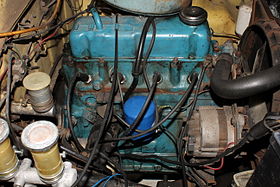Nissan J engine
This article needs additional citations for verification. (March 2012) |
| J engine | |
|---|---|
 | |
| Overview | |
| Manufacturer | Nissan |
| Production | 1965–1982 |
| Layout | |
| Configuration | Inline-4, Inline-6 |
| Displacement |
|
| Cylinder bore |
|
| Piston stroke |
|
| Cylinder block material | Cast iron |
| Cylinder head material | Cast iron |
| Valvetrain | OHV |
| Combustion | |
| Fuel system | Carburetor |
| Fuel type | Gasoline |
| Cooling system | Water-cooled |
| Output | |
| Power output | 68–140 PS (50–103 kW) |
| Chronology | |
| Successor | Nissan L engine |
The Nissan J series are straight-4 and straight-6 gasoline internal combustion engines produced by Nissan from the 1960s through the 1980s. It is similar to the BMC B-Series engine that was built in Japan under licence as the Nissan 1H before being de-stroked to become the 1.0 L Nissan C[1][2] and 1.2 L Nissan E engines,[3] but wasn't a direct copy.[4]
A version of Volkswagen's two-litre, "JL" five-cylinder engine was used in the (Nissan) Volkswagen Santana with 110–140 PS (81–103 kW) and was called the "J" engine by Nissan, but it shares nothing with the original J20 even though it is also a two-liter engine.
Straight-4
[edit]J13
[edit]An OHV engine of 1.3 L; 79.3 cu in (1,299 cc), the J13 was used in the 1965-1967 Datsun 411 sedan and wagon (originally only in the sporting "SS" series). Bore and stroke are 73 mm × 77.6 mm (2.87 in × 3.06 in).[5] It was also produced for the Datsun 520 and 521 trucks from 1967 to 1969 when it was replaced by the Nissan L engine. Mexican-assembled Bluebird 510s also received the J13 engine. The J13 was rated at 67 PS (49 kW; 66 hp).[5]
J15
[edit]The J13 was bored out to produce the J15, which was introduced in the Datsun 521 truck in 1969 and saw use in various Nissan pickup trucks like the 620 and 720 in various overseas markets through the 1970s and 1980s. It was also used in certain sedans like the 710. It was also used in the PA321 Datsun Cabstar. Bore and stroke are 78 mm × 77.6 mm (3.07 in × 3.06 in) for a displacement of 1.5 L (1,483 cc). The J15 produces 77 PS (57 kW; 76 hp). Max torque at 3400rpm with 12.0 kg.
J16
[edit]A 1.6 L (1,567 cc) iteration of the OHV J-series four cylinders was also built, mainly for utility vehicles. Bore and stroke are 78 mm × 82 mm (3.07 in × 3.23 in) for a total displacement of 1.6 L (1,567 cc). This engine was also installed by Nissan's Taiwanese partner Yue Loong in several iterations of the Nissan Violet, long after Nissan themselves had stopped using OHV engines in passenger cars.
Applications:
- 1972.09-1976.01 Nissan/Datsun Homer, Cabstar T20-series (81 PS or 60 kW at 5,400 rpm)[6]
- Yue Loong Violet 707 - Taiwanese built Nissan Violet, 80 PS (59 kW) SAE at 5,200 rpm[7]
- E23 Urvan some markets.
- 1972-1976 Nissan Homer T20
- 1979-1982 Nissan Datsun 720
J18
[edit]The J18 is a 1.8 L engine that was used in various Nissan models built in Mexico from the mid-1980s until the mid-1990s. Bore and stroke are 80.5 mm × 86.0 mm (3.17 in × 3.39 in), for an overall displacement of 1,751 cc (1.75 L; 107 cu in) and a power output of 89 hp (66 kW) with a Nikki window carburetor.
Straight-6
[edit]J20
[edit]The J20 is a 2.0 L (1,973 cc) inline-six engine. Bore and stroke are 73 mm × 78.6 mm (2.87 in × 3.09 in). It produces 109 hp (81 kW) and was used in the 1966-1969 Nissan Cedric 130. The J20 is basically a J13 with two extra cylinders, although the stroke is one millimeter more.
See also
[edit]References
[edit]- ^ Halberstam, David (2012). The Reckoning. New York: Open Road Integrated Media. ISBN 978-1453286104.
- ^ Britain & Japan : biographical portraits. Vol. VI. Folkestone, UK: Global Oriental Ltd. 2007. pp. 104–105. ISBN 978-9004217850.
- ^ "Tech Wiki - Datsun History : Datsun 1200 Club". datsun1200.com.
- ^ Bent, Alan. "Austin A40 and A50". EarlyDatsun.com. Archived from the original on 8 February 2015.
- ^ a b Quattroruote Speciale: Tutte le Auto del Mondo 1967 (in Italian). Milano: Editoriale Domus S.p.A. February 1967. p. 195.
- ^ Bent, Alan. "1966 Datsun Homer T641 Model". earlydatsun.com. Archived from the original on 2010-08-11. Retrieved 2011-02-07.
- ^ Quattroruote: Tutte le Auto del Mondo 77/78 (in Italian). Milano: Editoriale Domus S.p.A. 1977. pp. 554–556.


 French
French Deutsch
Deutsch